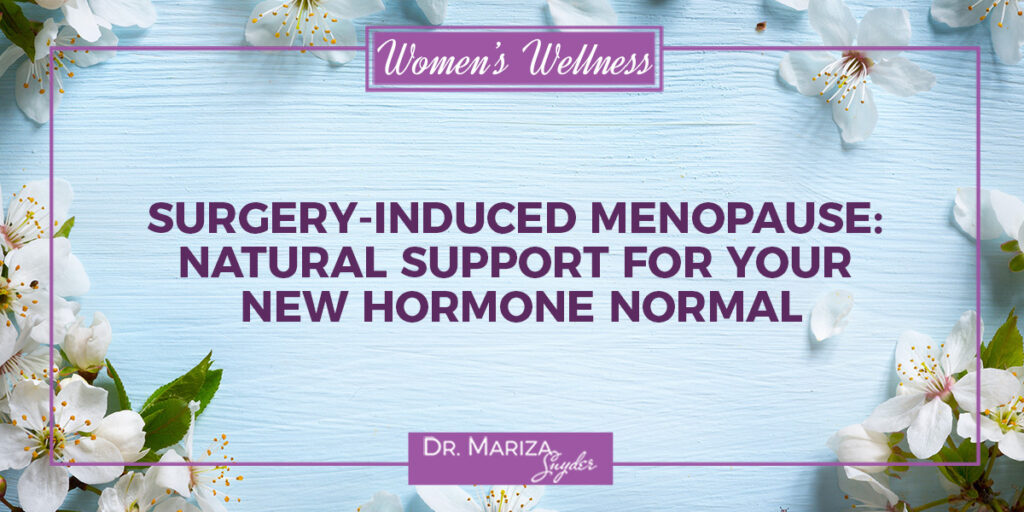
No matter your age, menopause can be frustrating — with your hormones changing, it can cause your whole body to feel off. Hot flashes, mood changes, and trouble sleeping are just a few of the many symptoms of menopause. (1)
Most women begin menopause around the age of 50. Sometimes, women undergo certain surgeries that jump-start this biological process years early — and have no perimenopause transition.
I typically don’t recommend surgeries like oophorectomies (removal of the ovaries), hysterectomies (removal of the uterus, which may also include an oophorectomy), or ablation (therapy that destroys abnormal tissue) unless absolutely necessary.
However, in some cases — like if you have cancer, genetic diseases, or inherited genes like BRCA1 and BRCA2 that put you at high risk for developing cancer, or another factor — it may be necessary for your health. (2)
Surgeries like this, along with chemotherapy, radiation, and ovarian insufficiency, may jump-start menopause. (1) This sudden change can be scary and devastating to how you’re feeling every single day.
If you make the choice to have surgery that begins menopause suddenly, it can be easy to feel very much not like yourself. While it may seem overwhelming, you’re not alone if you’re suffering from surgery-induced menopause — and you don’t have to suffer in silence.
You deserve to feel your happiest, healthy, and most balanced self. I’m here to help you adjust to your new normal, learn what you need to know about menopause, and care for your body in the way it deserves!
Tips to Support Your New Hormone Normal
Menopause is typically a biological process that happens naturally as your menstrual cycle stops. This process for most women happens around their 40s or 50s. However, your surgery caused this process to happen suddenly — rather than with a gradual transition.
During menopause, your body makes less of the hormones estrogen and progesterone, and you no longer have periods. (1)
To adjust to this big change, you need to support your new hormone normal. This means making mindful adjustments to support your body where you are. With a few simple changes, you can make this adjustment smoother and easier — you deserve to feel your best!
Do I Need Hormone Replacement Therapy?
When you experience a sudden change in hormones due to surgery, it may seem natural to try to balance your levels with hormone replacement therapy. However, if you’re optimizing your hormones effectively, in most cases, HRT won’t be necessary.
HRT may benefit women who are at high risk for certain conditions, like dementia, heart disease, osteoporosis, and stroke. (3)
However, many other women will be able to support their bodies and help ease this sudden change with natural solutions.
Giving your body proper adrenal support, eliminating inflammation, eating a well-rounded diet, and taking proper supplements are just a few small steps you can take to help balance your hormones naturally.
The Importance of Adrenal Support
As you go through menopause, your adrenal glands produce a hormone that can be converted into estradiol (a form of estrogen), as your ovaries are out of commission. (4)
Some health practitioners tout the idea of “adrenal fatigue,” when they believe your adrenal glands are functioning below optimal levels.
However, adrenal fatigue is often just an umbrella diagnosis doctors will give to people suffering from chronic fatigue and hormone imbalances. It doesn’t get to the root cause.
Learn why adrenal fatigue is a myth here.
When you go through this sudden change of surgery-induced menopause, it’s essential to give your adrenal glands the support they need to avoid symptoms of chronic fatigue and cortisol imbalance.
Some great ways to give your body adrenal support include:
- Reduce coffee and sugar intake
- Supplement with ashwagandha, rhodiola, and omega 3s
- Practice self-awareness and mindfulness
- Reduce excess stress in your life and take time for self-care
Looking for the perfect supplement to support your adrenal function? Adrenal Love has the perfect blend of Vitamin C, Pantothenic Acid, Ashwagandha, American Ginseng, Licorice, and more to give your adrenal glands the nutrients they need to function.
Eliminating Inflammation
The foods you eat directly affect your body functions. (5) A poor diet full of inflammatory foods can have a negative impact on your hormones — which affect everything from your sleeping patterns to your overall well-being.
Eliminating inflammation in your diet is a great way to help ease sudden hormone changes from surgery-induced menopause.
To eliminate inflammation:
Balance your diet
Try to avoid inflammatory foods, like (6) (7):
- Added sugars
- Fried foods
- Margarine, lard, and shortening
- Red and processed meat
- Refined carbohydrates
Incorporate plenty of anti-inflammatory foods into your diet, like (6):
- Leafy green vegetables
- Fatty fish
- Fruit, including blueberries, cherries, oranges, and strawberries
- Olive oil
- Tomatoes
Consider intuitive fasting
Coupled with a balanced diet, intuitive fasting is a great way to help balance your hormones and fight inflammation.
Detox
If you notice you’re struggling to concentrate, have off-the-chart sugar cravings, suffer from gastrointestinal issues, or have skin breakouts or inflammation, these can be signs it may be time for a detox.
Looking for a great home detox? Check out these 14-Day Home Detox packages to reset your body.
Supplement your foods
Even if you eat a full, balanced diet, it can be difficult to ensure your body gets all the nutrients it needs to support essential functions.
Supplements can be key to filling in the gaps to naturally support your hormones.
Drink some matcha
Studies have hailed matcha for its anti-inflammatory properties.
One study published in the journal Molecules noted matcha “contains high amounts of substances with antioxidant and anti-inflammatory effects” and added that the Japanese green tea “may support the body’s efforts to maintain health and prevent disease.” (8).
Focus on Key Nutrients Your Body Needs
One amazing way to help your body adjust to sudden surgery-induced menopause is by ensuring you get the key nutrients your body needs.
Getting to the bottom of your nutrient deficiencies, eating the right foods, and supplementing any gaps with the right vitamins can help give your body the support it needs to function and stay balanced.
Protein
During menopause, you may have decreased bone mass density and see decreases in your muscle mass and strength. (9) The European Society for Clinical and Economic Aspects of Osteoporosis and Osteoarthritis (ESCEO) recommends postmenopausal women eat 1.0-1.2 grams of protein per kilogram of body weight per day, but you may even need to go above that number to feel your best. (10)
If you struggle to get enough protein through the foods you eat, incorporating one of my high-quality protein powders into a daily green smoothie is a delicious and effortless way to increase your daily intake!
Magnesium
Magnesium is essential to ensuring your heart, muscles, nerves, and other parts of your body function smoothly. (11) Insufficient magnesium can also contribute to osteoporosis, which is a common concern during menopause. Ensuring you get enough magnesium can help support strong and healthy bones and other body functions during this change. (12)
It’s also essential for hormone conversion and detoxification, as well as lessen feelings of stress. This is the magnesium I recommend for ALL women!
B Vitamins
These are often referred to as “stress vitamins,” as B vitamins aid your body in managing stress. If you’re lacking in B vitamins during menopause, you may (13):
- Have heightened irritability
- Experience trouble concentrating
- Feel anxious
B vitamins support your adrenal glands, hormone production, nervous system, liver, and more — so it’s crucial to ensure you’re getting enough. (13)
If you’re taking a multivitamin with B vitamins, you may think you’re covered. However, an additional activated (or methylated) B-complex vitamin is essential, especially if you’re feeling irritable, fatigued, or on edge. Check out my favorite here!
Omega 3s
One small study found that women who took omega-3 fatty acids saw a decrease in a Montgomery-Asberg Depression Rating Scale (which rates the severity of depression) of more than 50%. Additionally, participants who took the supplement saw a reduction in the number of hot flashes compared to those who didn’t take a supplement. (14)
Vitamin D
Studies have shown the importance of sufficient vitamin D intake in menopausal women — specifically related to help prevent bone loss. (15) Research indicates that this vitamin may also ease the risk of “cardiovascular, metabolic, cognitive and affective disorders.” (15)
Check out this post to learn more benefits of upping your vitamin D (and why you shouldn’t just rely on your time in the sun to get it).
Eliminate Symptoms of Menopause as You Adjust to Your New Normal
Hot flashes, mood swings, a lower libido, and changes in your sleep schedule are just a few of the many changes you may experience from surgery-induced menopause. But there’s a way you can help all these symptoms.
Hot Flashes
Minding your insulin levels, reducing stress, eliminating inflammatory and carb-heavy food from your diet, using supplements to support your health, and essential oils to help cool you down during an episode are all solutions that can all help hot flashes.
Mood Swings
As you age, your protective hormones decline. With surgery-induced menopause, this process is jump-started, and your levels change suddenly. Making foundational changes to balance your stress and redefine your menopause journey are key to helping balance your mood.
Get the lowdown on declining hormones and how they can affect your body. Plus, learn why mindfulness is key to taking power over your life and how it can help you in times when you feel not like yourself.
Warding Off Stubborn Weight
Hormone imbalances can play a role in your mood — and may be affecting your weight and causing your jeans to suddenly get tighter.
Here’s how supporting your hormones through menopause and beyond can help you lose stubborn weight. (Also, here’s the why behind weight gain and your hormones if you’re a nerd like me and like to understand exactly what’s causing it.)
Low Libido
You’re not alone if you feel like your sex drive suddenly plummeted following surgery-induced menopause. (16)
Some simple additions to your daily routine — like yoga and essential oils — can help revamp your sex drive.
If it’s vaginal dryness or pain due to the sudden loss of estrogen in your body that is disrupting intimacy for you, check out this post for my favorite DIY lube & more tips to relieve this discomfort!
Sleep Disruption
If you find yourself suddenly unable to get a restful night’s sleep, suffering from night sweats, or feeling foggy, cranky, and tired during the day, it’s not abnormal. Many women suffer from sleep disruption during menopause.
Luckily, by knowing the root causes of sleep issues during menopause and how you can address them, you can be well on the way to a restful night’s sleep.
The Essential Oils Menopause Solution
You deserve to be abundantly full of energy, able to focus and feel like your happiest, healthiest, balanced self.
Don’t let surgery-induced menopause take power over your life. While it may be stressful at first, with some natural adjustments to your diet and daily habits, you can be well on the way to restoring hormone balance and being the happiest version of yourself.
If you’re looking to shatter menopause myths, end disruptive hot flashes and energy crashes, and boost your metabolism in just 21 days, check out The Essential Oils Menopause Solution book.
It contains everything you need to know to help ease your sudden hormone changes as you adjust to your new normal — and get back to the REAL you.
Order The Essential Oils Menopause Solution book today! >>
Order The Essential Oils Menopause Solution and Get Over $500 in Bonuses
References:
- https://www.mayoclinic.org/diseases-conditions/menopause/symptoms-causes/syc-20353397
- https://www.uofmhealth.org/health-library/tv1854spec
- https://www.mayoclinic.org/diseases-conditions/menopause/in-depth/hormone-therapy/art-20046372
- https://wholisticmedicalcentre.com.au/managing-menopause-with-adrenal-support/#:~:text=As%20our%20ovaries%20begin%20to,health%20and%20neuroprotection%20after%20menopause.
- https://www.mdpi.com/journal/nutrients/special_issues/diet_hormones
- https://www.health.harvard.edu/staying-healthy/foods-that-fight-inflammation
- https://health.clevelandclinic.org/5-foods-that-can-cause-inflammation/
- https://www.ncbi.nlm.nih.gov/pmc/articles/PMC7796401/
- https://pubmed.ncbi.nlm.nih.gov/19949277/
- https://pubmed.ncbi.nlm.nih.gov/25082206/
- https://www.hsph.harvard.edu/nutritionsource/magnesium/
- https://www.ncbi.nlm.nih.gov/pmc/articles/PMC3775240/
- https://www.healthspan.co.uk/advice/soothing-menopausal-stress-with-vitamin-b
- https://www.ncbi.nlm.nih.gov/pmc/articles/PMC3195360/
- https://pubmed.ncbi.nlm.nih.gov/24993517/
- https://www.health.harvard.edu/womens-health/yes-you-can-have-better-sex-in-midlife-and-in-the-years-beyond


No comments yet.